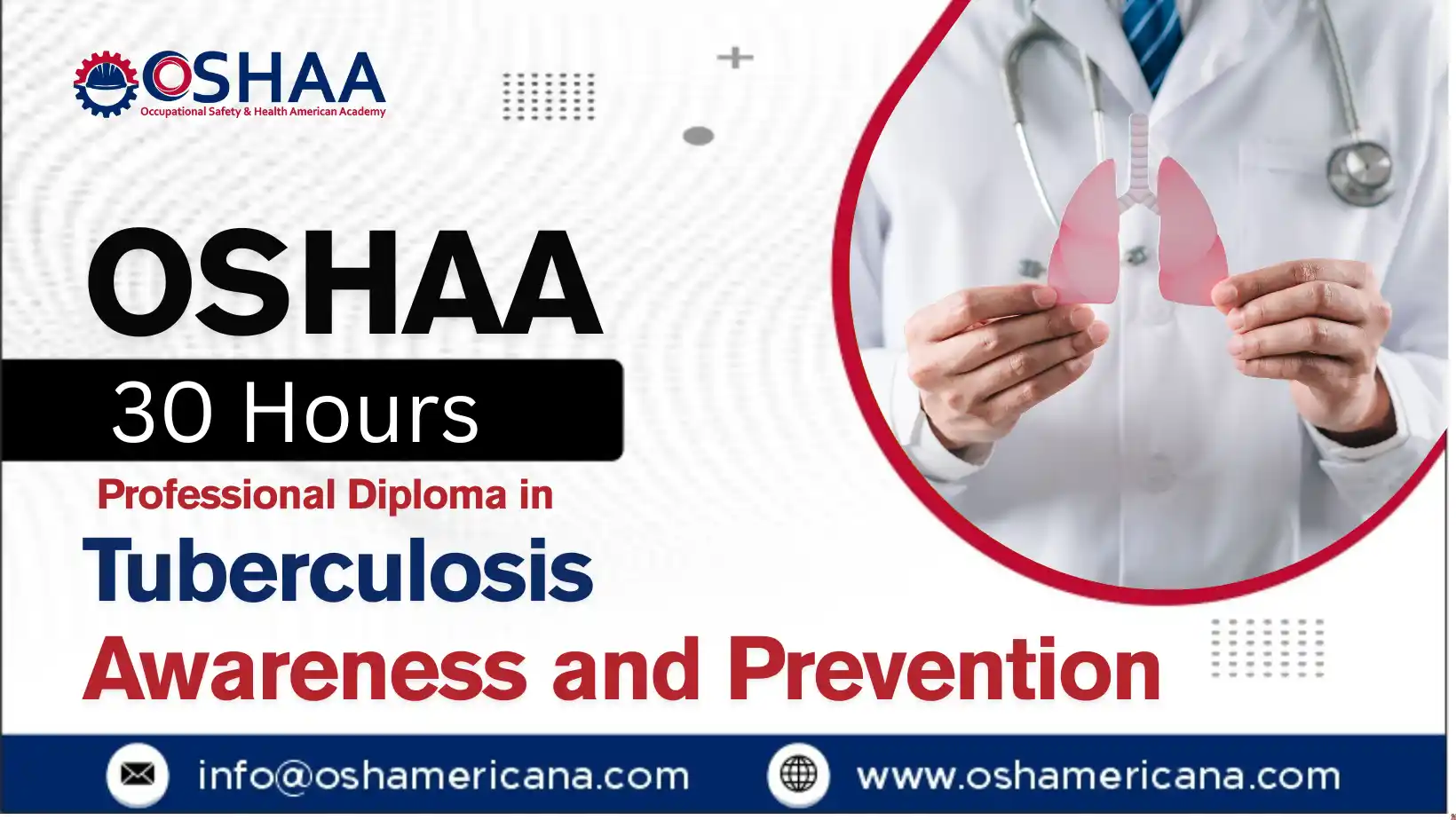Tuberculosis (TB) remains one of the world’s most pressing public health issues, despite being preventable and curable. The OSHAA 30-Hours Professional Diploma in Tuberculosis Awareness and Prevention offers essential education and training for healthcare professionals, caregivers, and community workers aiming to enhance their knowledge and response to TB.
TB is a potentially serious infectious disease that mainly affects the lungs but can impact other parts of the body. Caused by the bacterium Mycobacterium tuberculosis, it spreads through airborne particles when an infected person coughs or sneezes. According to the World Health Organization (WHO), millions are affected globally each year, particularly in low- and middle-income countries.
The OSHAA 30-Hours Professional Diploma in Tuberculosis Awareness and Prevention offers flexible, quality learning delivered by subject matter experts. The course structure is tailored to meet the demands of today’s health landscape, focusing on practical knowledge that can make a genuine difference in communities and health systems. Participants receive a recognised certificate upon completion, affirming their commitment to public health excellence.
OSHAA 30-Hours Professional Diploma in Tuberculosis Awareness and Prevention
Study Units
Learning Outcomes
Introduction to Tuberculosis and Global Health Significance (3 Hours)
- Understand the global and regional burden of tuberculosis
- Recognise the historical and current public health impact of TB
- Explain the goals of international TB control programmes
- Identify key organisations involved in TB prevention and treatment
Transmission, Risk Factors, and Vulnerable Populations (4 Hours)
- Describe how TB is transmitted and the factors that influence its spread
- Identify high-risk groups and environmental contributors to infection
- Explain the role of social determinants in TB prevalence
- Understand the importance of early identification in vulnerable populations
Signs, Symptoms, and Clinical Presentation of TB (5 Hours)
- Recognise the common and atypical signs and symptoms of TB
- Differentiate between latent and active TB infections
- Understand the impact of TB on various body systems
- Learn to identify when medical referral and testing are necessary
Diagnostic Techniques and Screening Protocols (4 Hours)
- Explore available diagnostic tools, including skin tests, blood tests, and imaging
- Understand national and international screening guidelines
- Evaluate the strengths and limitations of diagnostic methods
- Learn how to interpret basic test results and refer for confirmation
TB Prevention Strategies and Infection Control Measures (3 Hours)
- Apply best practices for infection prevention in clinical and community settings
- Understand the use and importance of personal protective equipment (PPE)
- Explain TB vaccination strategies and their effectiveness
- Implement protocols for reducing transmission in high-risk environments
Treatment Guidelines and Drug-Resistant TB Management (4 Hours)
- Gain knowledge of first-line TB treatment regimens and durations
- Understand how drug-resistant TB develops and how it is managed
- Recognise the importance of treatment adherence and patient support
- Learn about directly observed therapy (DOT) and its implementation
Community Engagement and Health Education Strategies (3 Hours)
- Develop strategies to raise awareness and educate communities on TB
- Learn effective communication methods for diverse populations
- Understand the importance of cultural sensitivity in public health messaging
- Support behaviour change initiatives to promote TB prevention
Workplace and Institutional TB Prevention Practices (2 Hours)
- Identify policies and procedures for TB prevention in workplaces and institutions
- Learn how to implement risk assessments and control measures
- Understand the responsibilities of employers and staff in TB management
- Promote a culture of health safety through awareness and compliance
- Acquire comprehensive knowledge of tuberculosis, including its causes, symptoms, and global impact
- Develop practical skills in TB prevention, early detection, and infection control
- Understand the management of drug-resistant TB and treatment protocols to improve patient outcomes
- Enhance your ability to communicate effectively about TB within communities and healthcare settings
- Gain expertise in implementing workplace and institutional TB safety practices
- Build confidence in supporting vulnerable populations and reducing TB-related stigma
- Receive a professional certification recognised for advancing careers in healthcare, public health, and community services
- Contribute meaningfully to public health initiatives aimed at controlling and eliminating TB
- Access flexible learning tailored for busy professionals and those seeking career development
- Join a network of health practitioners committed to improving global TB awareness and prevention efforts
- Healthcare professionals including nurses, doctors, and allied health workers seeking specialised TB knowledge
- Public health practitioners involved in infectious disease control and community health programmes
- Social workers, community health advocates, and NGO staff working with vulnerable populations
- Health educators and trainers aiming to deliver effective TB awareness sessions
- Students and graduates in medicine, nursing, public health, or related fields pursuing professional development
- Employers and occupational health personnel responsible for workplace health and safety
- Policy makers and administrators involved in designing and implementing TB prevention strategies
- Caregivers and family members supporting individuals affected by tuberculosis
- Anyone interested in understanding and contributing to tuberculosis control and prevention efforts







